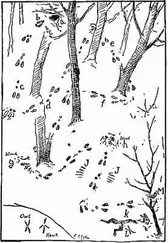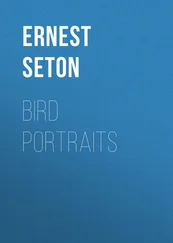Ernest Seton - Johnny Bear
Здесь есть возможность читать онлайн «Ernest Seton - Johnny Bear» весь текст электронной книги совершенно бесплатно (целиком полную версию без сокращений). В некоторых случаях можно слушать аудио, скачать через торрент в формате fb2 и присутствует краткое содержание. Жанр: Природа и животные, на английском языке. Описание произведения, (предисловие) а так же отзывы посетителей доступны на портале библиотеки ЛибКат.
- Название:Johnny Bear
- Автор:
- Жанр:
- Год:неизвестен
- ISBN:нет данных
- Рейтинг книги:3 / 5. Голосов: 1
-
Избранное:Добавить в избранное
- Отзывы:
-
Ваша оценка:
- 60
- 1
- 2
- 3
- 4
- 5
Johnny Bear: краткое содержание, описание и аннотация
Предлагаем к чтению аннотацию, описание, краткое содержание или предисловие (зависит от того, что написал сам автор книги «Johnny Bear»). Если вы не нашли необходимую информацию о книге — напишите в комментариях, мы постараемся отыскать её.
Johnny Bear — читать онлайн бесплатно полную книгу (весь текст) целиком
Ниже представлен текст книги, разбитый по страницам. Система сохранения места последней прочитанной страницы, позволяет с удобством читать онлайн бесплатно книгу «Johnny Bear», без необходимости каждый раз заново искать на чём Вы остановились. Поставьте закладку, и сможете в любой момент перейти на страницу, на которой закончили чтение.
Интервал:
Закладка:
There was one little trick that she had developed which was purely instinctive—that is, an inherited habit. In the back end of her kennel she had a little cache of bones, and knew exactly where one or two lumps of unsavoury meat were buried within the radius of her chain, for a time of famine which never came. If anyone approached these hidden treasures she watched with anxious eyes, but made no other demonstration. If she saw that the meddler knew the exact place, she took an early opportunity to secrete them elsewhere.
After a year of this life Tito had grown to full size, and had learned many things that her wild kinsmen could not have learned without losing their lives in doing it. She knew and feared traps. She had learned to avoid poison baits, and knew what to do at once if, by some mistake, she should take one. She knew what guns are. She had learned to cut her morning and evening song very short. She had some acquaintance with Dogs, enough to make her hate and distrust them all. But, above all, she had this idea: whenever danger is near, the very best move possible is to lay low, be very quiet, do nothing to attract notice. Perhaps the little brain that looked out of those changing yellow eyes was the storehouse of much other knowledge about men, but what it was did not appear.
The Coyote was fully grown when the boss of the outfit bought a couple of thoroughbred Greyhounds, wonderful runners, to see whether he could not entirely extirpate the remnant of the Coyotes that still destroyed occasional Sheep and Calves on the range, and at the same time find amusement in the sport. He was tired of seeing that Coyote in the yard; so, deciding to use her for training the Dogs, he had her roughly thrown into a bag, then carried a quarter of a mile away and dumped out. At the same time the Greyhounds were slipped and chivvied on. Away they went bounding at their matchless pace, that nothing else on four legs could equal, and away went the Coyote, frightened by the noise of the men, frightened even to find herself free. Her quarter-mile start quickly shrank to one hundred yards, the one hundred to fifty, and on sped the flying Dogs. Clearly there was no chance for her. On and nearer they came. In another minute she would have been stretched out—not a doubt of it. But on a sudden she stopped, turned, and walked toward the Dogs with her tail serenely waving in the air and a friendly cock to her ears. Greyhounds are peculiar Dogs. Anything that runs away, they are going to catch and kill if they can. Anything that is calmly facing them becomes at once a non-combatant. They bounded over and past the Coyote before they could curb their own impetuosity, and returned completely nonplussed. Possibly they recognized the Coyote of the house-yard as she stood there wagging her tail. The ranchmen were nonplussed too. Every one was utterly taken aback, had a sense of failure, and the real victor in the situation was felt to be the audacious little Coyote.
The Greyhounds refused to attack an animal that wagged its tail and would not run; and the men, on seeing that the Coyote could walk far enough away to avoid being caught by hand, took their ropes (lassoes), and soon made her a prisoner once more. The next day they decided to try again, but this time they added the white Bull-terrier to the chasers. The Coyote did as before. The Greyhounds declined to be party to any attack on such a mild and friendly acquaintance. But the Bull-terrier, who came puffing and panting on the scene three minutes later, had no such scruples. He was not so tall, but he was heavier than the Coyote, and, seizing her by her wool-protected neck, he shook her till, in a surprisingly short time, she lay limp and lifeless, at which all the men seemed pleased, and congratulated the Terrier, while the Greyhounds pottered around in restless perplexity.
A stranger in the party, a newly arrived Englishman, asked if he might have the brush—the tail, he explained—and on being told to help himself, he picked up the victim by the tail, and with one awkward chop of his knife he cut it off at the middle, and the Coyote dropped, but gave a shrill yelp of pain. She was not dead, only playing possum, and now she leaped up and vanished into a near-by thicket of cactus and sage.
With Greyhounds a running animal is the signal for a run, so the two long-legged Dogs and the white broad-chested Dog dashed after the Coyote. But right across their path, by happy chance, there flashed a brown streak ridden by a snowy powder-puff, the visible but evanescent sign for Cottontail Rabbit. The Coyote was not in sight now. The Rabbit was, so the Greyhounds dashed after the Cottontail, who took advantage of a Prairie-dog's hole to seek safety in the bosom of Mother Earth, and the Coyote made good her escape.
She had been a good deal jarred by the rude treatment of the Terrier, and her mutilated tail gave her some pain. But otherwise she was all right, and she loped lightly away, keeping out of sight in the hollows, and so escaped among the fantastic buttes of the Badlands, to be eventually the founder of a new life among the Coyotes of the Little Missouri.
Moses was preserved by the Egyptians till he had outlived the dangerous period, and learned from them wisdom enough to be the saviour of his people against those same Egyptians. So the bobtailed Coyote was not only saved by man and carried over the dangerous period of puppyhood: she was also unwittingly taught by him how to baffle the traps, poisons, lassoes, guns, and Dogs that had so long waged a war of extermination against her race.
III
Thus Tito escaped from man, and for the first time found herself face to face with the whole problem of life; for now she had her own living to get.
A wild animal has three sources of wisdom:
First, the experience of its ancestors , in the form of instinct, which is inborn learning, hammered into the race by ages of selection and tribulation. This is the most important to begin with, because it guards him from the moment he is born.
Second, the experience of his parents and comrades , learned chiefly by example. This becomes most important as soon as the young can run.
Third, the personal experience of the animal itself. This grows in importance as the animal ages.
The weakness of the first is its fixity; it cannot change to meet quickly changing conditions. The weakness of the second is the animal's inability freely to exchange ideas by language. The weakness of the third is the danger in acquiring it. But the three together are a strong arch.
Now, Tito was in a new case. Perhaps never before had a Coyote faced life with unusual advantages in the third kind of knowledge, none at all in the second, and with the first dormant. She travelled rapidly away from the ranchmen, keeping out of sight, and sitting down once in a while to lick her wounded tail-stump. She came at last to a Prairie-dog town. Many of the inhabitants were out, and they barked at the intruder, but all dodged down as soon as she came near. Her instinct taught her to try and catch one, but she ran about in vain for some time, and then gave it up. She would have gone hungry that night but that she found a couple of Mice in the long grass by the river. Her mother had not taught her to hunt, but her instinct did, and the accident that she had an unusual brain made her profit very quickly by her experience.
In the days that followed she quickly learned how to make a living; for Mice, Ground Squirrels, Prairie-dogs, Rabbits, and Lizards were abundant, and many of these could be captured in open chase. But open chase, and sneaking as near as possible before beginning the open chase, lead naturally to stalking for a final spring. And before the moon had changed the Coyote had learned how to make a comfortable living.
Читать дальшеИнтервал:
Закладка:
Похожие книги на «Johnny Bear»
Представляем Вашему вниманию похожие книги на «Johnny Bear» списком для выбора. Мы отобрали схожую по названию и смыслу литературу в надежде предоставить читателям больше вариантов отыскать новые, интересные, ещё непрочитанные произведения.
Обсуждение, отзывы о книге «Johnny Bear» и просто собственные мнения читателей. Оставьте ваши комментарии, напишите, что Вы думаете о произведении, его смысле или главных героях. Укажите что конкретно понравилось, а что нет, и почему Вы так считаете.




